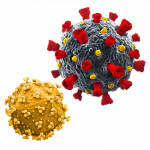The integrase inhibitor Isentress (raltegravir) could lead to the development of an effective treatment against all herpes viruses, including strains that can cause blindness and cancer, according to an announcement by researchers from the Institute for Research in Biomedicine (IRB) in Barcelona. The researchers’ complete findings were published online August 30 in the Proceedings of the National Academy of Sciences.
Miquel Coll, PhD, the senior author of the paper and a researcher at the IRB, has been working for some time with his fellow researchers to help resolve the structural proteins that help herpes viruses reproduce.
The herpes family includes herpes simplex, which can cause oral or genital ulcers; herpes zoster (varicella), which causes chickenpox and shingles; Epstein-Barr virus, which is associated with several types of cancer; cytomegalovirus, which can lead to blindness and potential worsen the course of HIV disease; and Human Herpes Virus-8, which can cause Kaposi’s sarcoma.
One step in the herpes replication process takes place within the nucleus of a target human cell, where the human DNA is contained. The herpes virus is able to hijack the human DNA to make long strands of viral DNA. To form new infectious viruses, however, these long DNA strands must be chopped up and repackaged. The molecular complex responsible for this process is called terminase, and that’s where Coll and his colleagues have been focusing, as this complex is shared by all of the herpes family of viruses.
When the researchers built a 3D model of the terminase, they realized that it strongly resembled the HIV integrase protein of HIV. Given that Isentress binds to this protein, and is an approved drug with a known safety profile, Coll’s group next explored whether Isentress would bind to the herpes terminase, which it did. The next step is to test Isentress in cell cultures and determine its effect on a variety of herpes strains.
“These results have a clear medical impact,” Coll said. “Now we must do the assays on whole infected cells, improve the effect of the drug and validate that it is also effective for other kinds of herpes viruses.”
Advertisement
Advertisement
Advertisement






12 Comments
12 Comments